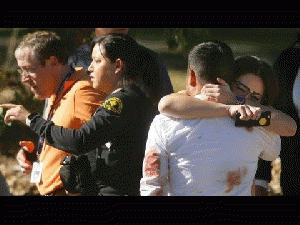Reprinted from Reader Supported News
The FBI has, yet again, dropped the ball. For all the billions of dollars in their budget, for all the metadata they and their intelligence colleagues are collecting on every American citizen, and for all the years they've had since the September 11 attacks to recruit informants to infiltrate terrorist groups, two people with ties to Muslim militants were able to perpetrate yet another mass shooting, this time resulting in 14 dead in San Bernardino, California.
One of the shooters, Syed Farook, was "in contact" with terrorism suspects, but the FBI now admits that it did nothing about it. Indeed, a spokesman said that the contact was "soft," meaning that it wasn't frequent. The implication is that Americans aren't supposed to worry when somebody is in direct contact with a terrorist suspect overseas. It's not important enough for the FBI to follow up on. Until, of course, that person shoots up a social services center and kills 14 people.
The problem here is deep, and it is one of longtime FBI incompetence, mismanagement, and intransigence.
I wrote in my book, "The Reluctant Spy: My Secret Life in the CIA's War on Terror," of an incident in which I personally witnessed FBI incompetence -- in Peshawar, Pakistan, in 2002, when I was the chief of CIA counterterrorism operations there.
I was part of a team that raided the Taliban embassy in Peshawar that year. As part of our "haul," we confiscated a set of file folders that contained more than a year's worth of the embassy's phone bills. Those bills showed hundreds of calls from the Taliban to phone numbers all across the United States -- Buffalo, Kansas City, Sacramento, Tampa, Detroit, and elsewhere. Those calls ended abruptly on September 10, 2001, and then started up again on September 16.
Who was receiving these calls? Why were they receiving calls from the Taliban? It was possible that they were Afghan nationals with legitimate consular issues. But it was equally plausible that they were working for or with the Taliban in some way, possibly against the United States. Could they have been spies? Were they "sleepers," tasked with living quiet lives until called upon to carry out an attack? We didn't know. I informed CIA Headquarters and was told that it was an FBI issue. I then sent the original phone bills to the FBI, with copies to the CIA, and then I returned to my regular business.
Months passed. I returned to CIA Headquarters and, in the summer of 2002, I ran into an FBI agent with whom I had worked in Pakistan. "What happened with those Taliban phone bills?" I asked. The FBI was waiting for Pashto translators to become available. "Pashto translators?" I asked. "But those bills were written in English. That's how I knew what they were."
I resigned from the CIA a year and a half later. Again I ran into a former FBI colleague. "Whatever happened to those Taliban phone bills?" "Oh," he said, "they ended up being shipped to an FBI storage facility in suburban Maryland."
Just like in the final scene of Raiders of the Lost Ark, the box of phone bills was never even opened. We'll never know if there was or is a threat to Americans originating with the Taliban or Taliban sympathizers. We'll never know why those Americans were in contact with the Taliban immediately before and immediately after September 11.
This seems to be what happened again last week in San Bernardino. Metadata collection is no substitute for human intelligence and good police work. But even with the information that Farook was in contact with terrorist suspects, the FBI did nothing. This time people died. Heads should roll.






